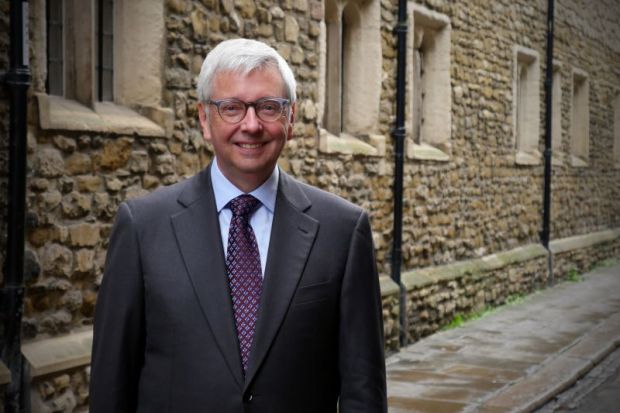Universities have not “risen to the challenge” of collaboration as much as might have been hoped in the fight against Covid-19 in part because of a push to “get there first” on solutions like a vaccine, according to the vice-chancellor of the University of Cambridge.
Speaking at Times Higher Education’s World Academic Summit, Stephen Toope said that although geopolitical tensions were partly to blame for hindering cooperation, academia had not completely “covered itself in glory” either.
His points were countered by Andrew Hamilton, president of New York University, who said “the desire to be first” was what pushed the boundaries of science, although it had to be “assisted” by collaboration.
Both leaders were speaking in an online debate at the summit about whether the race for a coronavirus vaccine was bringing the world together or creating more division.
Professor Toope said that as well as the “tremendously sad lack” of global political leadership during the pandemic, “universities themselves have not necessarily risen to the challenge collaboratively in the way that we might hope in these circumstances”.
“Part of that has been shaped by the geopolitics…but I also think it is fair to say there has been a certain amount of ‘trying to get there first’…in relation to…a vaccine,” he said.
However, Professor Hamilton, himself a former vice-chancellor of the University of Oxford, said he was more optimistic about the race for a vaccine and the way that universities were working on the challenge in conjunction with others.
“Universities are filled with contradictions: we are traditional, but we are also innovative; we are global in our outlook, but we are also local; and we can also be competitive and collaborative both at the same time,” he said.
“And competition is an important force in science. Stephen questioned the desire to be first in doing something: that is what pushes us forward, that is what accelerates progress. Competition is a good thing, but it is also very much assisted by collaboration.”
He added that while “of course the way the pandemic has been handled around the world leaves a great deal to be desired”, there were “great models for collaboration” involving universities and also often industry that “we can build upon” to tackle other challenges such as climate change.
Another panellist, Agnes Binagwaho, vice-chancellor of the Rwanda-based University of Global Health Equity, said it was important for politicians to stay out of how research networks were established.
“I think the politicians should free the money to help the universities to set up a framework of better collaboration, with key performance indicators and accountability, but…politicians have done so much harm in the Covid fight that they stop there,” she said.
Earlier, she had noted that universities also needed to be the link between research and communities to help explain why a vaccine was so vital in the fight against the pandemic.
“One of the roles for universities is to be a bridge between science and communities…especially when you have governments and powerful people in the world who just say, ‘I don’t care [about science], I have my gut to tell me [what to do]’,” she said.
Marijk van der Wende, distinguished professor of higher education at Utrecht University, said the “big question” that was arising from the research landscape around Covid-19 was whether it was steering science towards less openness.
“We have to acknowledge that some of our ideals are being challenged – autonomy, but also the value of higher education and research as a global public good. The outcomes of our research in terms of a potential vaccine seem to be nationalised and commercialised, although there are important efforts to prevent this,” she said.
“All of this has not necessarily helped in terms of trust…in science. It is not that easy to have an open scientific debate when at the same time we are expected to advise public authorities and health authorities.”
Register to continue
Why register?
- Registration is free and only takes a moment
- Once registered, you can read 3 articles a month
- Sign up for our newsletter
Subscribe
Or subscribe for unlimited access to:
- Unlimited access to news, views, insights & reviews
- Digital editions
- Digital access to THE’s university and college rankings analysis
Already registered or a current subscriber? Login








